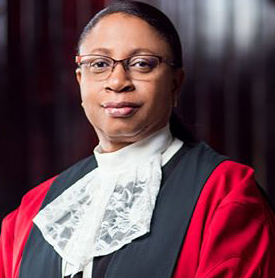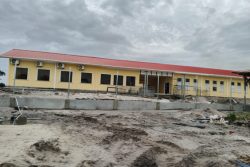Acting Chief Justice Roxane George-Wiltshire SC last night granted a conservatory order staying a previous order made by Principal Magistrate Sherdel Isaacs-Marcus for 26 Haitian nationals to be deported.
During the virtual hearing which was convened at 7 last evening, the Chief Justice made it clear that her order which will override the magistrate’s order, is not intended to be a concession on anything.
She clarified that it is rather to maintain the status quo until the matter before her would have been fully heard and determined.
She then set December 18th at 1:30 for arguments.
Before eventually acceding to the grant of the conservatory order, however, Attorney General (AG) Anil Nandlall SC made several objections.
Nandlall commenced by arguing that the Court has no jurisdiction to entertain the application. He said that the Fixed Date Application (FDA) filed by attorney Darren Wade seeks to invoke the fundamental rights sections of the constitution which applies to Caribbean and Commonwealth peoples, but which in specific circumstances would offer no constitutional coverage to Haiti.
He said that while they would have protection under CARICOM they would not under the Commonwealth.
The AG then advanced that while there is provision for free movement under the Caricom Single Market and Economy (CSME) arrangement, “Haiti in its current state” would not qualify for free movement like other territories which are signatories to the agreement.
This prompted the judge to enquire from Nandlall what he meant by “Haiti in its current state.”
In response the AG said that while Haiti is a member of CARICOM it has not fully activated the protocols conferred by the CSME arrangement as it never completed that process.
The judge then sought to enquire from Nandlall whether the case was one with a CSME issue or simply of free movement; to which he said that the FDA speaks to certain violations under the agreement.
He noted, too, that Haiti had not signed on to the free movement aspect of the agreement. The AG said that a determination of all these issues which touch and concern the CARICOM Treaty and the CSME would be for the Caribbean Court of Justice (CCJ) in its original jurisdiction and not the local Supreme Court.
The judge pointed out that that may be why the applicants did request a referral to the Trinidad-based CCJ.
Nandlall, however, questioned the means by which the referral would be done if as he contends, the High Court has no jurisdiction to hear the matter.
Maintaining that the court has no jurisdiction to hear the matter, he said that it cannot be referred to the CCJ on its own.
He would, however, eventually agree to the conservatory order being granted.
Justice George-Wiltshire said that all the issues raised by counsel will be dealt with at the hearing.
The 26 Haitian nationals including seven children have been detained for weeks at the state-run Hugo Chavez Centre for Rehabilitation and Reintegration.
The individuals were to be deported for allegedly lying about where they would be staying during their visit to Guyana.
According to Wade who has been representing the interest of the detained immigrants, the action is “arbitrary” and was conducted with a clear disregard to his clients’ rights to Natural Justice.
“They were not informed of, nor allowed to respond to the charge. There is no evidence I have seen supporting the contention made in the applications,” he had previously told Stabroek News in an invited comment.
The Ministry of Home Affairs announced last week that the Haitian nationals were found after the police conducted two search-and-cordon exercises in Georgetown and Region Ten.
Some of the Haitian nationals were discovered in a city hotel while others were found in a minibus on the Linden-Mabura road. Among those found were seven children—two boys and five girls.
According to a ministry statement, the discovery was made as part of an investigation into a suspected human smuggling racket and trafficking in persons ring.
The Haitians have however denied any involvement in trafficking.
Wade in presenting their case had argued that since those detained had committed no crime or been accused of committing any crime their detention was illegal.
The Attorney General’s Chambers had, however, disclosed that the Haitians were being kept in custody for deportation.








